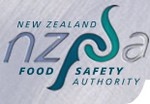Take the heat out of summer
As warmer temperatures hit home, the New Zealand Food Safety Authority (NZFSA) is reminding families of the importance of following good hygiene and food safety practices in the home, especially if you're preparing lunchboxes for littlies or planning a weekend picnic.
Warmer weather allows bacteria on food to quickly double in numbers – so school lunches and picnic baskets can spoil in a suprisingly short time, especially if they're left out in the sun.
You can stop the onslaught of micro-organisms that can quickly turn a lunchbox treat into a recipe for foodborne illness by following a few simple guidelines.
The golden rule is that cold food should be kept chilled. So, if you're planning a day trip, pack your food in a chilly bag or bin, and use plenty of icepacks.
For school lunches you can freeze drink bottles overnight to give you an instant slicker pad. Pack perishable foods, such as cold meats, chicken or egg sandwiches between cold items such as yoghurts and fruit salads.
Consider insulated lunchboxes and picnic bags. Encourage your children to store their food out of the sun – in or under their desk, in a cool cloakroom or in the coolest part of the classroom.
It is usually safe to make up food ahead of time, such as the night before, providing you store it in the fridge overnight. In the case of lunchboxes, don't be tempted to re-pack any leftovers from the previous day and wash them out every night.
If you are preparing large quantities of food for a group of children or for several lunches, put it to cool quickly in the fridge, or freeze small, single-serve quantities, so you can defrost them individually.
Ensure your kitchen benches, hands and utensils are clean when you're preparing and packing the food, and wash and dry any fruits and vegetables – including those you've grown yourself – thoroughly. When buying fruit, don't be tempted to pick up damaged items and avoid foods that may be tricky to clean, such as raspberries.
Following the 4Cs – Clean, Cook, Cover, Chill – and the 20+20 hand wash rule (20 seconds wash plus 20 seconds dry = clean hands) are among the most effective ways to ensure you keep your food safe, and stay healthy. When you're preparing food to eat outdoors, remember:
• keep cold food chilled
• keep food covered until you're ready to cook or eat it
• marinate food in the fridge, not on the benchtop
• cook food properly
• separate raw and ready-to-eat food
• keep kitchen and utensils clean
• wash your hands before and after handling food (especially raw meat and poultry), going to the toilet, changing nappies, playing with pets or gardening.
There is more information on food safety on NZFSA's website: www.nzfsa.govt.nz and the website of the Foodsafe Partnership: www.foodsafe.org.nz
